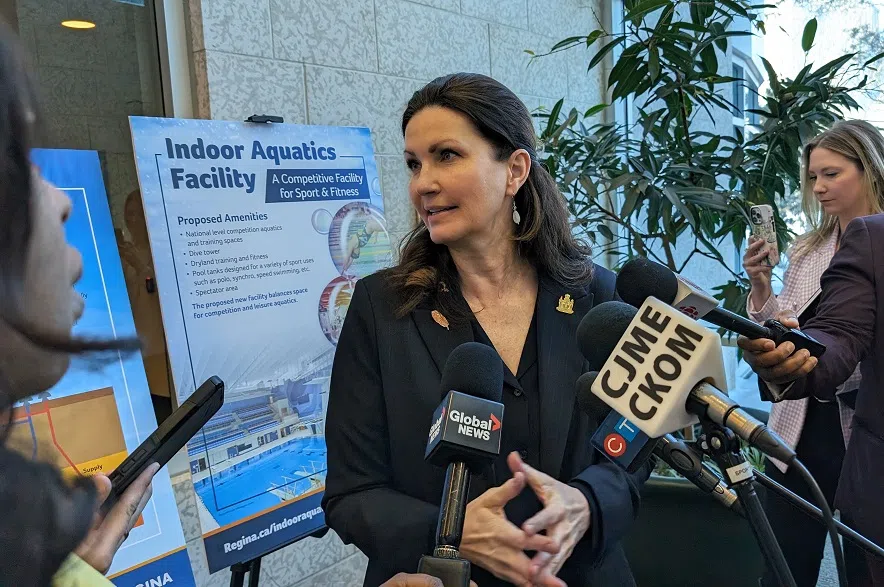As far back as 2010, a new aquatics centre was ranked as the No. 1 priority for the City of Regina in its recreational master plan.
Building the facility also was one of the promises Sandra Masters made during her campaign to become Regina’s mayor in 2020.
On Thursday, the municipal, provincial and federal governments announced an investment of $128.1 million for the construction of a new aquatics facility that will be heated by geothermal energy.
“It feels really good,” Masters said during a media event. “Sometimes I think ideas should come to light faster. (I’m) a little bit naive in terms of time frames, but I guess if it has been identified 14 years ago and it took us three years to get to this point, that’s really good.”
The recreation facility — which is expected to cost more than the $180 million predicted in 2021 — will replace the Lawson Aquatic Centre, which was built in 1975. Masters said the new centre will be built behind the Lawson on Taylor Field land and, when it’s finished, the Lawson will be demolished.
It’s unclear when construction will begin.
“I think May is a great time, but I’m not going to get my way,” Masters said. “They’re going to go into more community engagement … We’ve done pre-engineering and so now we’re going to work into the actual engineering and design.”

Regina Mayor Sandra Masters discusses the plan for a new aquatic centre for the city. (Lisa Schick/980 CJME)
The city has been told it will cost $1.5 million to maintain the Lawson over the next couple of years and $6 million over the next five to seven years before its life span ends. For that reason, Masters said she wants construction to start quickly.
“What we’re looking for is to get in the ground and get this facility open as fast as possible so we’re not maintaining a facility that it’s absolutely necessary that we maintain,” she said. “Getting (the Lawson) to close sooner rather than later would be the preference.”
The Lawson currently gets more than 170,000 swim visits each year, the governments said in a release. The new facility is expected to host about 600,000 visits by swimmers each year.
It will feature two 50-metre tanks compared to the Lawson’s one, and will have what Masters called “a significant recreational portion.” There also will be more community spaces, amenities and changerooms.
The hope is that the building will help Regina attract Western Canadian and national championships in sports such as swimming, diving, water polo and synchronized swimming. Events like that, as well as the facility’s recreational portion, could also result in an increase in tourism dollars.
Premier Scott Moe, whose government is investing $36 million in the project, gave credit to Masters and Regina’s city council for seeing the need to replace the Lawson. He also thanked the federal government for having the Investing in Canada Infrastructure Program in place so the three levels of government could collaborate.
“When it gets to the community level, this is what attracts young families into your community,” Moe said. “This is what brings families to Regina and every other community across Saskatchewan.”
The new aquatics centre will feature a deep geothermal heating facility, a clean energy source that the governments said will draw hot water from deep underground. That naturally occurring hot water will be used to heat the facility before being returned to the earth.
Masters said the city spent $280,000 to team up with the Petroleum Technology Research Centre and the University of Regina on research and a feasibility study on the geothermal aspect of the project.
“When it came back and showed us what that energy — that heat energy — coming up could do for us in terms of long-term savings as well as reduction in emissions, it sold it,” said Masters, who noted the geothermal heating is expected to save the city $60 million over the facility’s 50-year life span.
“I think its massively important. We are trying to get to a place and have stated a commitment to try to get as close to net-zero facilities as we can. This one gets us really close.”
Sean Fraser, the federal minister of housing infrastructure and communities, said the federal government is happy to help fund a project that will help the Queen City grow while reducing greenhouse gas emissions at the same time.
“I am excited that this new facility will not only do that, but will also bring people together for decades to come,” Fraser said in a release.
The aquatics centre was one of five projects proposed to the public and studied by a catalyst committee in 2022.
There has been some opposition to its construction over the years, but Masters said it’s important to invest in a project that will give people in the community an opportunity to gather and to address their health and wellness.
“To not have it means we’re taking opportunity away from people,” she said.











